Good nightpublished at 19:52 BST 27 April 2020
That's all for our live updates today.
Join us again tomorrow morning for the latest developments on how the coronavirus pandemic is affecting Scotland.
As of Monday at 9am, there have been 1,262 deaths of people with Covid-19 in Scottish hospitals - up 13 on yesterday
PM Boris Johnson returns to work and makes an address outside 10 Downing Street
He asks the public to "contain your impatience" as the country comes out of its first phase "of this conflict, and we have so nearly succeeded"
Research by BBC Scotland has found that thousands of vulnerable people have lost homecare packages during the lockdown
Five military-staffed mobile testing units will be operational in Scotland from this week
Health secretary Jeane Freeman says a labelling issue on PPE stuck at Prestwick Airport after being flown in from China will be resolved this week
BBC Scotland News
That's all for our live updates today.
Join us again tomorrow morning for the latest developments on how the coronavirus pandemic is affecting Scotland.
Here are the main developments from Monday:
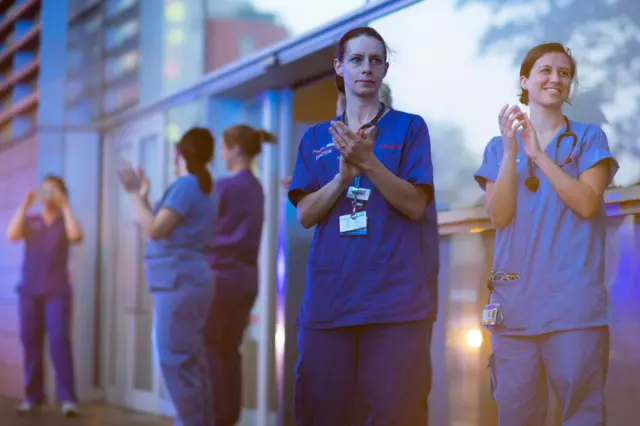 Image source, Getty
Image source, GettyThe Scottish government is in the process of putting together its own death in service benefit for frontline staff who die after catching coronavirus.
After UK Health Secretary Matt Hancock announced a £60,000 payment for bereaved families of NHS staff, the Scottish government said it was already working on a scheme.
Health Secretary Jeane Freeman wrote to the health and sport committee to update members on death in service arrangements on 24 April.
A Scottish government spokeswoman said: "The health secretary confirmed last week that the Scottish government is establishing a scheme that provides a death in service lump sum and survivor’s benefits to all staff directly employed by NHS Scotland boards, including NHS bank and NHS locum staff.
"We are working with partners to finalise the scheme’s terms and conditions and aim to publish further details by 1 May, with scheme benefits applying retrospectively, to ensure that no-one is disadvantaged.”
Visits to online film-piracy sites in the UK are up 43% since before lockdown measures came into effect, piracy-monitoring company Muso says.
The "unprecedented gains" are reflected in other countries across the world, the company's data suggests.
The largest increase was seen in Italy, one of the first countries to go into lockdown, where it surged 66%.
But while film and software piracy have risen, pirated TV numbers have dropped due to a lack of live sport.
A vaccine would provide some protection by training people's immune systems to fight the virus so they should not become sick.
But how easy is it to create a vaccine? And when could we expect one to be ready? The BBC's health correspondent Laura Foster takes a look:
Coronavirus: How close are we to getting a vaccine?
 Image source, Getty Images
Image source, Getty Images"It would be a bit like a glorified sparring match," says Scotland's boxing world champion Josh Taylor on the prospect of fighting without fans.
The super-lightweight was due to defend his two titles in Glasgow this weekend but the outbreak of coronavirus led to a postponement.
So what about bouts behind closed doors as a possible way forward for the sport?
The 29-year-old from Prestonpans told the 5 Live Boxing Podcast: "It's not ideal. For me, it would be quite hard to get up for.
"If the crowd wasn't there you'd lose that wee bit of nervousness walking out. Just as you get ready to walk out, you see the crowd and think this is it man, what I live for and there's no way I'm getting beat. It fires you up."
 Reality Check
Reality Check
In the UK government briefing, Health Secretary Matt Hancock revealed that 37,024 tests for coronavirus were carried out on Sunday.
That’s far below the government’s target of 100,000 daily tests by the end of April, with only four days to go.
Up until recently, the government was carrying out about 20,000 tests a day, so this represents an almost doubling of that figure.
 Reality Check
Reality Check
Health Secretary Matt Hancock has encouraged people to use the NHS if they need to for things like chest pain, and not be put off by coronavirus.
The latest weekly figures from the Office for National Statistics showed that 18,516 people had died from all causes in the UK in the week to 10 April, external
That figure was 7,996 more than the average for the time of year, but 6,213 of those people had coronavirus mentioned on their death certificates.
That means 1,783 extra people died who were not suspected of having coronavirus. We are not sure what they died of, but the health secretary is keen to avoid extra deaths due to people being reluctant to go to A&E if they need to.
There have now been more than three million cases of Covid-19 recorded around the world, according to tracking by Johns Hopkins University, external.
More than 208,000 people are known to have died.
It's the sound of birds, not jets, filling the air in the capital.
Allow X content?
This article contains content provided by X. We ask for your permission before anything is loaded, as they may be using cookies and other technologies. You may want to read X’s cookie policy, external and privacy policy, external before accepting. To view this content choose ‘accept and continue’.
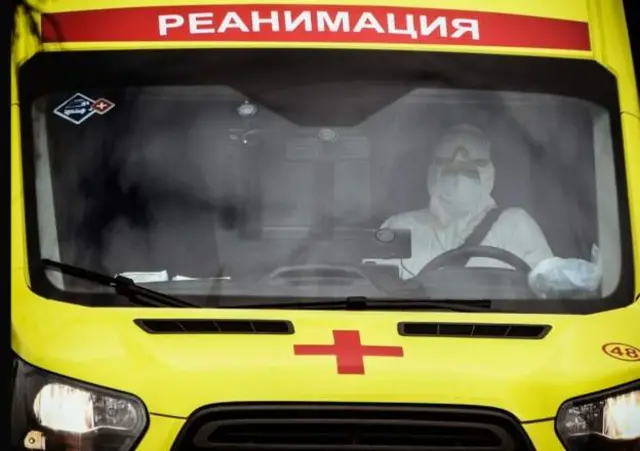 Image source, Getty Images
Image source, Getty ImagesRussia's official recorded tally is now higher than China's
While the UK briefing has been going on we've heard that Italy’s new cases have dropped to a seven-week low. Meanwhile, restoration work is getting under way again at Notre-Dame cathedral. Here’s the latest from Europe:
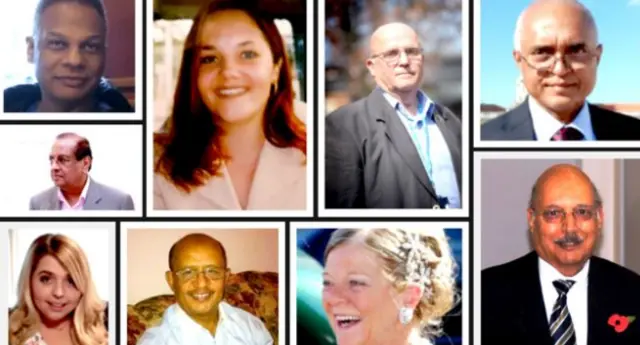
There will be a minute's silence across the UK at 11:00 BST on Tuesday to remember key workers who have lost their lives to coronavirus.
Government workers will take part, and No 10 said it hoped others will too.
Prime Minister Boris Johnson has backed the plan, following a campaign by the Royal College of Midwives, the Royal College of Nursing, and Unison, the union.
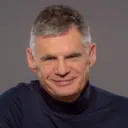 Drivetime with John Beattie
Drivetime with John Beattie
BBC Radio Scotland
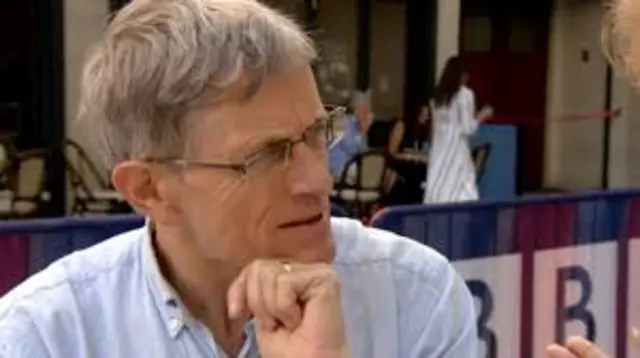
Travel expert Simon Calder is not hopeful that summer holidays will go ahead as planned
Earlier on Drivetime travel expert Simon Calder told John Beattie it was looking less likely that our summer getaways could survive.
He said there were five tests that would determine if Scots can jet off to the sunshine.
1. Can you get to the airport legitimately? At the moment that's a no as we are asked to stay at home.
2. Has the Foreign Office lifted its ban on all but essential travel abroad? At the moment that is still in place.
3. Is there an airline prepared to fly you? Many are struggling to survive.
4. Does your destination country want you there? Spain, France and Italy do want us there but not right now.
5. Will you tolerate the rules required of you when you return to Scotland? You might touch down and be ordered to stay home for 14 days - with strict enforcement.
Allow X content?
This article contains content provided by X. We ask for your permission before anything is loaded, as they may be using cookies and other technologies. You may want to read X’s cookie policy, external and privacy policy, external before accepting. To view this content choose ‘accept and continue’.
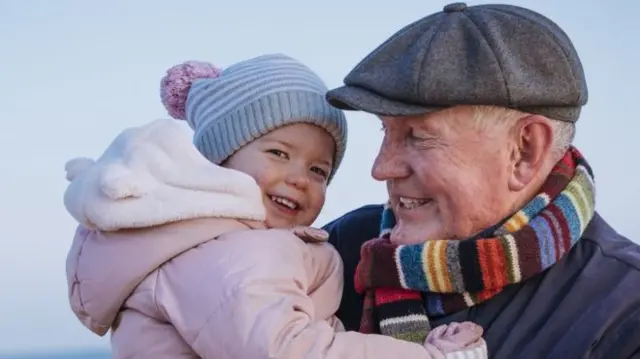 Image source, Getty Images
Image source, Getty ImagesWhen can we hug our grandchildren?
Lynne from Skipton is the first member of the public to get her question asked at the UK government briefing.
She says she is missing her grandchildren so much, and wants to know if when measures start to be eased, being able to hug them will be one of the first steps.
Prof Chris Whitty says for many, being able to interact with family is "absolutely essential".
But he warns that it "depends on the situation", and if she is older and needs to be shielded, she will still need to be protected.
Matt Hancock says he understands the impact of not being able to hug closest family, adding: "It affects all of us too.
"We just hope we can get back to that as soon as possible and way to get there fastest is to follow the rules on social distancing."
Professor Jason Leitch, the Scottish Government's national clinical director has been answering listeners' questions on BBC Radio Scotland's Drivetime.
Q: Can my parents, in their 60s but generally good health, take my brother, who has weak immune system and lives separately, for a socially-distanced short walk?
A: You cannot mix with any other household. Some countries are beginning to talk about experimenting with what are being called bubbles, extending contacts with strict controls. We are not there yet, but it is something we are considering.
Q: When can we get back to playing golf?
A: Sport will not all come back at the same time. You could imagine something like golf returning before Celtic v Rangers or Hearts v Hibs. I can't give you any dates but we have been speaking to Scotland's sporting authorities.
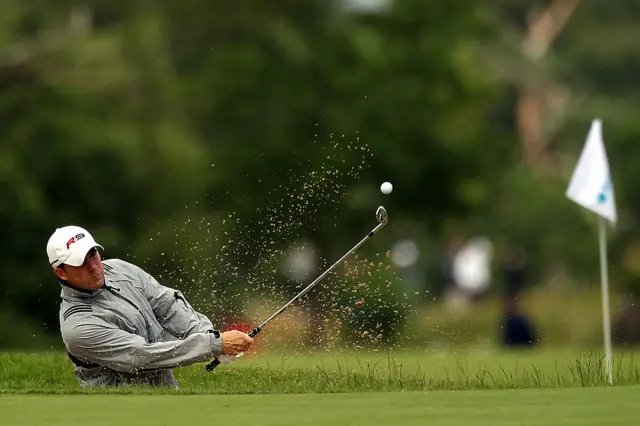 Image source, Getty Images
Image source, Getty ImagesAllow X content?
This article contains content provided by X. We ask for your permission before anything is loaded, as they may be using cookies and other technologies. You may want to read X’s cookie policy, external and privacy policy, external before accepting. To view this content choose ‘accept and continue’.
 Drivetime with John Beattie
Drivetime with John Beattie
BBC Radio Scotland
Professor Jason Leitch, the Scottish Government's national clinical director has been answering listeners' questions on BBC Radio Scotland's Drivetime.
Q: We have second property that is less than an hour's dive away, can one of us go to check it out?
A: No. Is this travel essential? That's the only question you should be asking yourself. Something like that would be good but, it's not essential.
Q: Is there a government ruling prohibiting removing relatives from care homes and taking them into your home?
A: No. But we need to be very careful because such residents are often very frail. Usually in Scotland, people are in care homes because they need a level of care that cannot be provided at home.
Allow X content?
This article contains content provided by X. We ask for your permission before anything is loaded, as they may be using cookies and other technologies. You may want to read X’s cookie policy, external and privacy policy, external before accepting. To view this content choose ‘accept and continue’.
 Drivetime with John Beattie
Drivetime with John Beattie
BBC Radio Scotland
Professor Jason Leitch, the Scottish Government's national clinical director has been answering listeners' questions on BBC Radio Scotland's Drivetime.
Q: When a jogger is passing a pedestrian on the pavement, who should move?
A: We need to use common sense, we don't want tension on the street. There's normally plenty of room and, in the main, things are moving smoothly.
Q: When are dentists likely to get back to normal service?
A: Emergency dentistry is available right across Scotland just now, with high level PPE. I think some procedures will come back quicker than others, with aerosol generating procedures (the ones that create more saliva) to follow others.